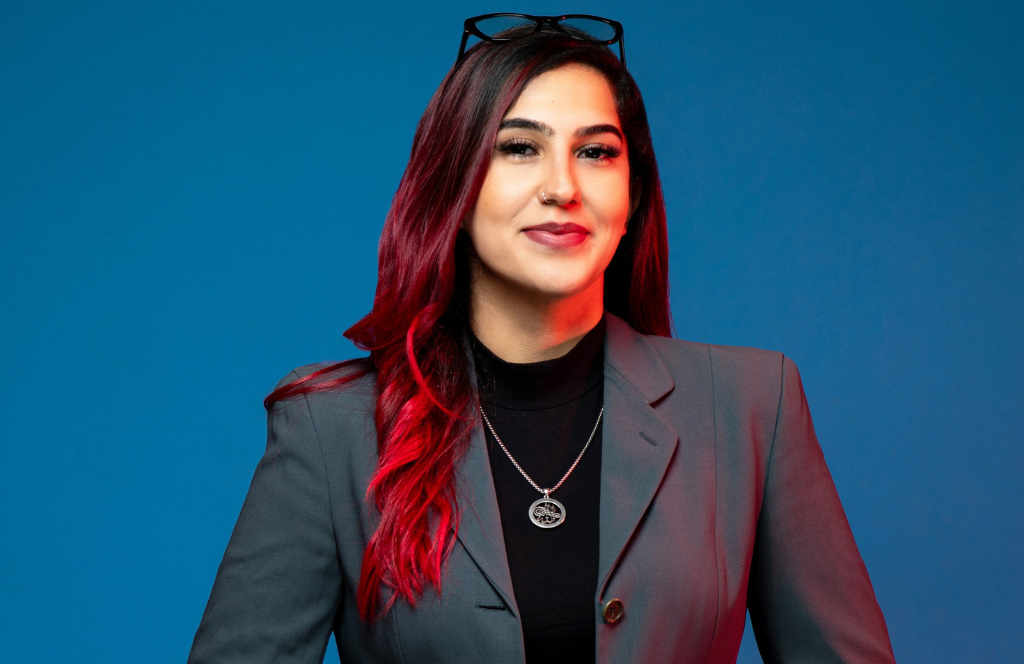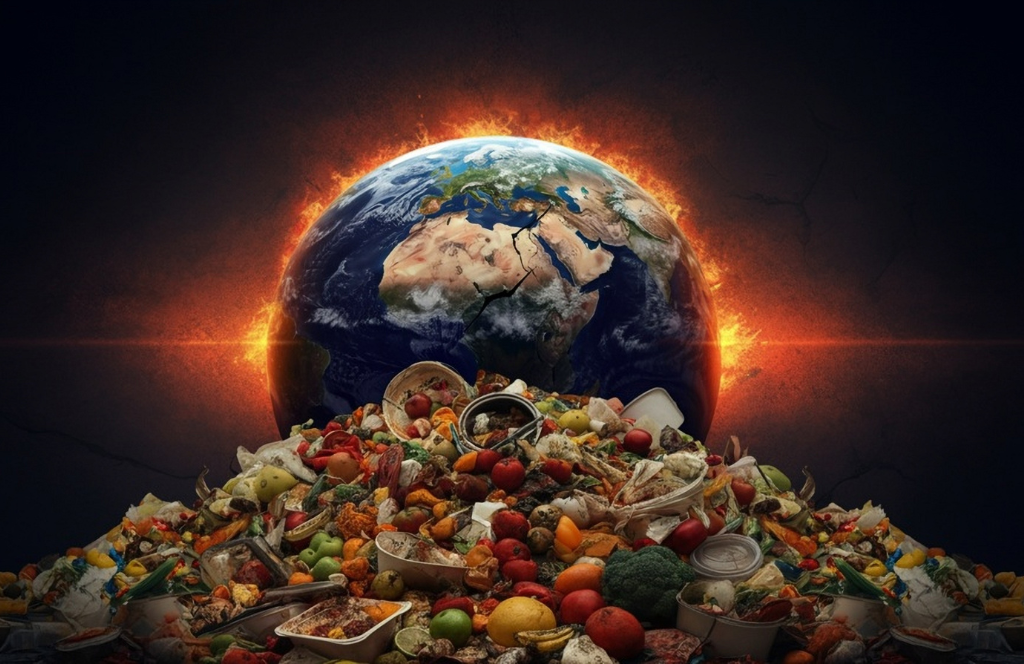Inspiring young female entrepreneur Rana Hajirasouli is changing how SMEs (small and medium-sized enterprises) see and use their waste. As the founder of The Surpluss, the world’s leading AI-powered digital industrial symbiosis platform, which combines supply and demand for resources and facilitates transfers – providing the world’s first B2B platform for sharing surplus resources.
She aims to change business psychology so sustainability is not a one-off project but a circular and deeply embedded business process that is easy to use and even financially rewarding. She is changing how businesses see and use waste through innovative climate technology.
“That’s the vision behind The Surpluss – to reallocate excess resources in an efficient way to help businesses thrive, not just survive,” says Rana Hajirasouli.
Learn more about Rana Hajirasouli’s inspiring journey.
Q&A With The Surpluss Founder, Rana Hajirasouli
1) What inspired you to start The Surpluss?

The inspiration for The Surpluss came from an unlikely (and kind of strange!) place: slime mold. Watching Physarum polycephalum in action was mind-blowing—here’s this single-celled organism, no brain, no hierarchy, yet it’s solving optimization problems our most sophisticated algorithms struggle with. As I delved deeper into some of its processes, I noticed it solves complex problems like mapping out the most efficient routes between multiple food sources by dynamically adapting its network—essentially replicating the efficiency of Tokyo’s railway system without any central control, purely through decentralized decision-making and resource optimization. Natures’ 3.8 billion years of R&D (research and development) certainly has far more clever ways to model economies of the future – using minimal energy and resources to create efficient, adaptive networks that flex and reconfigure in response to changing environments.
We’re facing a climate crisis that our current linear systems simply can’t handle. Our rigid, siloed supply chains break down in the face of disruptions, leaving waste and inefficiency in their wake. But what if we could mimic the way slime mold operates? What if businesses could exchange resources dynamically, collaborate like nodes in a living network? That’s the vision behind The Surpluss – to reallocate excess resources in an efficient way to help businesses thrive, not just survive.
2) What is the bravest thing you’ve done while building The Surpluss?
The bravest thing I’ve done was refusing to conform to the traditional, profit-first mindset that dominates the startup world. Early on, I made the decision not to take commissions on transactions—a move that went against every piece of advice from VCs, mentors and investors who urged me to prioritize quick returns. Instead, I stayed true to my vision of creating a genuinely collaborative, circular economy platform where value is derived from impact, not just revenue. It was risky, especially when funding was tight, but holding that line allowed The Surpluss to grow authentically and gain trust from businesses genuinely committed to sustainability and create a lasting product that focused on a triple bottom line approach: people, planet and profit.
3) What is a non-negotiable in your routine that keeps you focused?
Structure is very important to keep healthy and disciplined, so I apply this principle both in and out of work. Some non-negotiables of my schedule are specific times, each week, that hardly change – I know it sounds boring, but a rigid routine really helps keep me grounded. Whether it’s practicing piano, studying Mandarin, or even boxing. I like to stick to and choose specific disciplines that challenge different parts of my brain, and help me overcome some of my weaknesses – whether it’s hand eye coordination or technical problem solving. I strongly believe the way that you spend your free time says a lot about your endurance as a start up founder, and after all, it is not a sprint, even though much of the time it feels like it.
4) What has been your biggest challenge while on this journey?

The biggest challenge has been navigating the tension between pushing for systemic change and facing the inertia of established industries. Building The Surpluss meant challenging entrenched, linear business models while advocating for circular, collaborative solutions. It is also easy to get tempted by “quick wins” that make a quick buck that would not necessarily align with the long-term goals, so my team and I have had to make some difficult choices. Balancing that vision with the practicalities of startup survival has been a constant learning curve, and honestly, it doesn’t get easier, but over time, the experience helps make better informed decisions.
5) What advice would you give to other female entrepreneurs?
Do not shy away from taking up space and expressing your opinion, even if it is against the grain. I spent far too much of my career shying away from speaking up, challenging execution plans I did not agree with and doing things I did not enjoy or get mental stimulation from. The tech world can be intimidating, especially for women, but don’t let anyone make you second-guess your instincts. Find people who are better, wiser, and have different skill sets than you to mentor you, join your team, or challenge you to become better. Most importantly, let curiosity take precedence over ego. It is a lonely journey as a founder, but a strong support system of people who want the best for the idea goes a long way.
6) How do you define success?
The usual KPIs are great, but there is something deeper and more personal about this. Success is knowing we’re creating resilient systems that actually address the climate crisis, helping communities take ownership over their resources, and genuinely provide a useful tool for small businesses to compete with the behemoths, like fast fashion brands, which are leaving no room for economies of scale. I believe in failure when we are just paying lip service to sustainability. For me, it is about integrity—knowing I didn’t cut corners to get there.
7) What is the next project or goal you would like to work on?
Finishing my doctoral thesis with some of my sanity in tact.
8) What is your favourite book or podcast?
Nate Hagens’ podcast is fantastic, it is actually the only one I listen to. I’m currently reading Extreme Economies by Richard Davies which gives some great insights as to what we can learn from distressed economies hit by natural disasters. I would also highly recommend Biomimicry: Innovation Inspired by Nature by Janine Benyus.
Learn more about the The Surpluss.
What to Read Next? Bold BusinessWomen: Q&A With Entrepreneur Expanding Little Minds, Desriee Asomuyide
Join our email to learn more about bold BusinessWomen.












![Did you know Beyoncé is this close to billionaire status? 💸 Her net worth is estimated at $800 million—and climbing. She’s the most awarded and nominated artist in Grammy history. But she’s not just making music. As the founder of @parkwood, she built a creative empire for her music, films, and cultural projects. And now, she’s entered the spirits game with her own whiskey brand, @sirdavis. 🥃 One of the most powerful Black female entrepreneurs of our time—and one of the best-selling artists ever.
✨ Read her full journey → [link in bio] #BusinessWomen #Beyonce #NetWorth #Parkwood #SirDavis #WomenInMusic #BlackExcellence #FemaleEntrepreneurs #BoldMoves #FromStageToCEO #WomenWhoLead Did you know Beyoncé is this close to billionaire status? 💸 Her net worth is estimated at $800 million—and climbing. She’s the most awarded and nominated artist in Grammy history. But she’s not just making music. As the founder of @parkwood, she built a creative empire for her music, films, and cultural projects. And now, she’s entered the spirits game with her own whiskey brand, @sirdavis. 🥃 One of the most powerful Black female entrepreneurs of our time—and one of the best-selling artists ever.
✨ Read her full journey → [link in bio] #BusinessWomen #Beyonce #NetWorth #Parkwood #SirDavis #WomenInMusic #BlackExcellence #FemaleEntrepreneurs #BoldMoves #FromStageToCEO #WomenWhoLead](https://scontent-ams2-1.cdninstagram.com/v/t39.30808-6/495255594_122184586070306459_2350172612755558244_n.jpg?stp=dst-jpg_e35_tt6&_nc_cat=106&ccb=7-5&_nc_sid=18de74&_nc_ohc=k0LH-0-gU9wQ7kNvwEh_sug&_nc_oc=AdnzaPevYmIxdAn0logXiQwzeXf7uaehHEbTQ_x4SO_8OyRVGQ02qZG8nTc9zrM4-eA&_nc_zt=23&_nc_ht=scontent-ams2-1.cdninstagram.com&edm=ANo9K5cEAAAA&_nc_gid=az-o4femkMMBQb8sSknBtQ&oh=00_AfLX7j8jDlFCl-AGTtEG-32FRumaAhyXiRnkM2f7TBGg-Q&oe=68295F47)

![@amygriffin is betting on women. She is a powerhouse in venture capital, known for backing bold, female-led brands and reshaping the consumer landscape. She founded @g9_ventures that has backed stand-out brands like @bumble, @goop, and @hellosunshine. She’s also the best-selling author of The Tell—an Oprah’s Book Club pick. 📚 ✨ Learn more about Amy → [link in bio] #AmyGriffin #G9Ventures #FemaleInvestors #BoldLeadership #WomenWhoInvest #VentureCapital #WomenBackingWomen @amygriffin is betting on women. She is a powerhouse in venture capital, known for backing bold, female-led brands and reshaping the consumer landscape. She founded @g9_ventures that has backed stand-out brands like @bumble, @goop, and @hellosunshine. She’s also the best-selling author of The Tell—an Oprah’s Book Club pick. 📚 ✨ Learn more about Amy → [link in bio] #AmyGriffin #G9Ventures #FemaleInvestors #BoldLeadership #WomenWhoInvest #VentureCapital #WomenBackingWomen](https://scontent-ams4-1.cdninstagram.com/v/t39.30808-6/493054012_122183900978306459_6601743929500349133_n.jpg?stp=dst-jpg_e35_tt6&_nc_cat=109&ccb=7-5&_nc_sid=18de74&_nc_ohc=HIIJiQj3ttwQ7kNvwFAm5ai&_nc_oc=AdnjyAliqnCXssrJXPkJzZ3K8D1CjveCYg2zC2_ZzT7iF4A6-3jRKGPFtAXPXFJrMsU&_nc_zt=23&_nc_ht=scontent-ams4-1.cdninstagram.com&edm=ANo9K5cEAAAA&_nc_gid=az-o4femkMMBQb8sSknBtQ&oh=00_AfJqn5rAJyXCIHp0OYtoG3WPeycnEdGF6GP10sQxKzv01A&oe=68295848)
